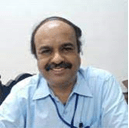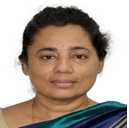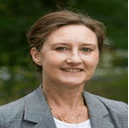ADVISORS & COLLABORATORS

Prof. K. Sankaran,PhD.
Senior Scientific Advisor
Multidrug resistance is a major challenge to the efficacy of antibiotic therapy. Out-of-the-box thinking in providing results on the choice of the right antibiotic with quicker and more accurate antibiotic sensitivity test first followed by pathogen detection and the quest for a simple extracellular biochemistry, led to the discovery of Erucamide release by bacteria and the patented method of its quenching of a specific fluorophore in the medium within hours. This simple growth monitoring was converted to an inexpensive clinically validated instrumentation method, and manual, semiautomated and automated devices. This academic to market capability in University system led to his coordination of multi crore National Hub for Healthcare Instrumentation Development of Department of Science and Technology, Government of India and other such prestigious national programmes to the University.
He is considered a world leader in bacterial lipid modification of proteins owing to the discovery and pioneering molecular enzymology studies including the crystal structure of the first enzyme of the essential pathway, ProLiporptoein Diacylglyceryl Transferase (LGT), and identifying the pathway, intricacies and commercial applications. He has now developed a technique hailed as the first post-translational protein engineering tool for a range of biomedical applications of national and global importance like ELISA, Biosensors, next-generation antibiotic target, efficacious vaccines and targeted drug delivery. The rare combination of academic teaching and research, industrial R&D, international collaborations, coordination of multidisciplinary teams of scientists, engineers and clinicians with industries and government, and administrative experiences has made him a competent advisor for funding and other government agencies. Post retirement, from the last year he is dedicating himself to nation building through networking for aiding indigenous healthcare device manufacturing and marketing for affordable quality healthcare for bulk of the population.

Prof. Prasanna Venkatraman,PhD.
Academic and Research Advisor
Dr. Prasanna Venkatraman is the Deputy Director at Cancer Research Institute (CRI) Maharashtra, India. Her research interest includes Protein-protein interactions (PPI), typify physical, signalling and regulatory networks that orchestrate cellular responses. She finished her PhD from Prof. Balram’s laboratory in IISc Bangalore and did her post-doctoral research under Prof. A. Goldberg from Harvard and under Prof. Lawrence Stern from UMAS Medical school after which she joined ACTREC in 2006. She is a pioneer in ubiquitin proteasome system, structural biology and its role in physiology, disease and drug discovery.

Dr. C. Soundararajan, M.V.Sc, PhD
Dr. C. Soundararajan, is an eminent parasitologist with profound interest in pathological and diagnostic research in veterinary sciences. His achievements include 22 years in Teaching, Research, Farm and Extension Education. He is currently the Director of Tamil Nadu Veterinary and Animal Sciences University (TANUVAS), Tamil Nadu, India. He has established 850 stall fed Goat and 37 Sheep Farms and also developed a “Dorset Nilagiri Synthetic Sheep” breed.His expertise in ELISA, Dot-EIA and PCR for the diagnosis of T.annulata is well known. He has completed various research projects that has socioeconomic importance which includevaccine trials against Haemonchuscontortus and Fasciola species, clinical trials of Eprinomectin, control of Fasciola gigantica, Otobiusmegnini, mange, myiasis, coccidiosis and Fleas and epidemiology of gastrointestinal nematodes, which are major livestock affecting parasites.

Dr.Cecilia Stålsby Lundborg,PhD.

Dr. Vaibhav Srivastava,PhD.
Dr.Vaibhav Srivastava is a scientist and group leader in the Department of Chemistry at the KTH Royal Institute of Technology, Sweden. He is a multidisciplinary scientist with many years of experience in the field of plant and microbial biotechnology. His research is focused on sustainable aquaculture and agriculture associated with food security and disease control. His group uses bioinformatics, molecular biology, and biochemical approaches to understand the molecular and physiological pathways associated with the development, pathogenicity, and host specificity of oomycetes pathogens. He is also involved in teaching various master’s-and PhD- level courses.

Dr. A. Bhargavi Krishna,MDS.
Dr. A. Bhargavi Krishna, MDS professor in dental sciences,
Specialized in the field of oral and maxillofacial pathology and
microbiology with 13 years of Experience in clinical &
histopathological diagnosis of biopsy specimens and cytology.
Expertise in haematological, biochemical & microbiological
investigations and their interpretations. Actively involved in various
research projects, exclusively worked on premalignant disorders
and Oral cancer. Published about 20 scientific articles in national and international journals.
Knowledge on applications of advanced diagnostic methods like ELISA, IHC & PCR.
After 2 decades in the large company world, Jan Erik entered the startup field and became CEO of PrintDreams, where the founder Alex Breton developed what would become the world’s smallest printer for mobile use. He led a team of 15 people with 10 different nationalities who mainly developed the technology based on built-in real-time systems. The 5 generation prototype was presented and attracted a lot of attention in the market and not least the media.
Another important change in Jan Erik’s professional career was when he took over as CEO of the public company ContextVision AB, which develops image processing software for medical imaging equipment (magnetic resonance cameras, X-rays and ultrasound products). The company sells its product to manufacturers of medical imaging products worldwide. In connection with the launch of its product for ultrasound devices, the company grew successfully by over 300% with very good profitability. The company increased its customer base from around 20 to over 60 in Europe, the Middle East, China, Japan, the USA, Canada and Israel.

Jan Erik Hedborg
MSc.
